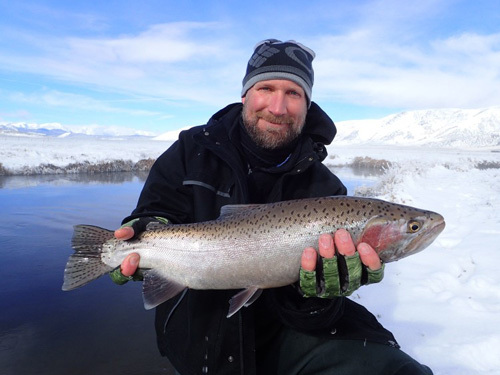
Report Date:
https://tomloe.com/This has been the coldest start to winter I have seen in many years here. Not much snow; however most days the ice never stops forming on your rod guides. There is enough snow on the two track roads to get you stuck without an all wheel drive vehicle. The “snow bows” have increased in numbers recently. Flows have come up improving overall conditions. Crowley has completely iced over, & is at the highest water level in two years already. This has triggered a solid push of winter run rainbows to move upstream onto the gravel beds. During the warmer periods a few smaller rainbows and browns have also been active adding to the fish counts. Timing the weather is the key to getting on these trophy fish. When we get an extended period of sub-zero air temps; it forces the LADWP to flush the standing ice out of the Rush Creek Diversion and washes debris, & ice bergs down the channel. Eddies will become solid sheets of ice making the river unfishable. If air temps warm enough, & the flushing is successful-the river can clean up in the afternoon. Overall water clarity has become poor below Hot Creek. The fish are very spread out, & are actively on their redds during warmer periods. They vacillate from the gravel beds into the deeper pools when we experience a duration of colder air temps. I have seen a few honey holes that have multiple fish in them; but this year you can expect one or two bigs per spot for the most part. Most popular attractor patterns will get you looks with solid drifts. SJ worms, crystal Vanderleeches, crystal soft eggs, Assassins, and Agent Orange patterns have got us into them while nymphing below an Under-cator. Please don’t squeeze the egg laden hens near the belly for a quick picture. That will cause the roe to discharge prematurely. Air temperatures below ten degrees can “flash freeze” the gills if you keep the fish out of water for more than a minute. Look for oval depressions that appear brighter, or scraped clean on the riffles below pools. These are active spawning nests; or “redds” and you must avoid stepping on them.